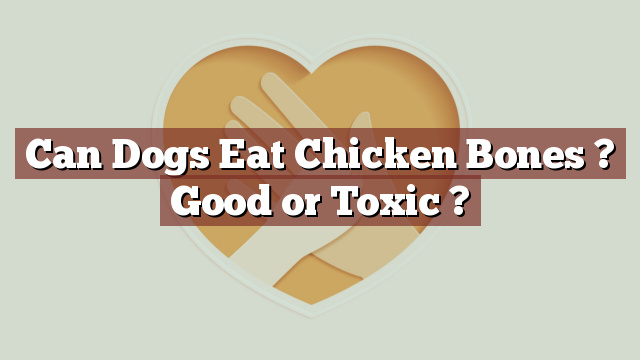Can Dogs Eat Chicken Bones? Safe or Toxic?
Knowing what foods are safe for your dog to consume is crucial in ensuring their overall health and well-being. One common question that dog owners often ponder is whether it is safe for their canine companions to eat chicken bones. Let’s delve into this matter and determine whether dogs can safely consume chicken bones or if they pose a potential risk to their health.
Nutritional Value of Chicken Bones
Chicken bones, particularly the soft and pliable ones, are a source of essential nutrients for dogs. They are rich in calcium, phosphorus, and trace minerals, which are vital for maintaining strong bones and teeth. Additionally, the bones contain collagen, which is beneficial for joint health and the overall integrity of connective tissues. It is important to note that the nutritional value of chicken bones is mostly derived from the bone marrow and cartilage surrounding them.
Can Dogs Eat Chicken Bones? Safe or Toxic?
The consumption of chicken bones by dogs can be extremely dangerous and potentially life-threatening. The primary concern lies in the fact that chicken bones can splinter easily, leading to a range of health issues. When a dog chews on or ingests chicken bones, the sharp fragments can cause severe injuries to their mouth, throat, and gastrointestinal tract. These injuries may include lacerations, punctures, internal bleeding, or blockages.
It is important to highlight that even cooked chicken bones, which are more brittle than raw ones, can cause similar hazards. The cooking process weakens the bones, making them even more prone to splintering. As a responsible pet owner, it is crucial to prioritize the safety of your dog by avoiding the feeding of chicken bones altogether.
Potential Risks or Benefits of Dogs Consuming Chicken Bones
Despite the nutritional value chicken bones may possess, the potential risks associated with dogs consuming them outweigh any potential benefits. The sharp fragments can cause severe injury and internal damage, leading to complications such as choking, gastrointestinal obstruction, or perforation. These conditions may necessitate immediate medical attention and potentially invasive procedures to alleviate the complications.
Moreover, allowing your dog to eat chicken bones may encourage them to develop a habit of scavenging for bones or other hazardous items. This behavior can further increase the risk of them ingesting harmful substances or objects, leading to potential emergencies or health issues.
What to Do if Your Dog Eats Chicken Bones
If you suspect or catch your dog in the act of consuming chicken bones, it is crucial to act promptly and seek veterinary advice. Do not induce vomiting without consulting a veterinarian as it may exacerbate the situation or cause additional harm. Your vet will assess the severity of the situation and may recommend various diagnostic tests, treatments, or interventions depending on your dog’s symptoms and condition.
Conclusion: The Safety and Considerations of Feeding Dogs Chicken Bones
In conclusion, it is not safe for dogs to eat chicken bones. The potential risks of choking, internal injuries, and gastrointestinal complications far outweigh any potential nutritional benefits. As responsible pet owners, it is crucial to prioritize the safety and well-being of our furry friends by providing them with appropriate and safe food choices. If you have any concerns or questions regarding your dog’s diet or if they have ingested chicken bones, always consult with a veterinarian for proper guidance and advice.
Thank you for investing your time in exploring [page_title] on Can-Eat.org. Our goal is to provide readers like you with thorough and reliable information about various dietary topics. Each article, including [page_title], stems from diligent research and a passion for understanding the nuances of our food choices. We believe that knowledge is a vital step towards making informed and healthy decisions. However, while "[page_title]" sheds light on its specific topic, it's crucial to remember that everyone's body reacts differently to foods and dietary changes. What might be beneficial for one person could have different effects on another. Before you consider integrating suggestions or insights from "[page_title]" into your diet, it's always wise to consult with a nutritionist or healthcare professional. Their specialized knowledge ensures that you're making choices best suited to your individual health needs. As you navigate [page_title], be mindful of potential allergies, intolerances, or unique dietary requirements you may have. No singular article can capture the vast diversity of human health, and individualized guidance is invaluable. The content provided in [page_title] serves as a general guide. It is not, by any means, a substitute for personalized medical or nutritional advice. Your health should always be the top priority, and professional guidance is the best path forward. In your journey towards a balanced and nutritious lifestyle, we hope that [page_title] serves as a helpful stepping stone. Remember, informed decisions lead to healthier outcomes. Thank you for trusting Can-Eat.org. Continue exploring, learning, and prioritizing your health. Cheers to a well-informed and healthier future!

